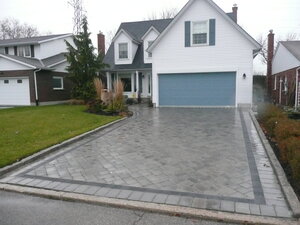With over 20 years of experience creating outdoor living spaces for our clients one of the most common questions we’ve received is “Why should I use interlock pavers over concrete” or “Why should I use concrete over interlock pavers?”
Each material has its own advantages and drawbacks. Budget, area on the property, access to the construction site and use of the area all are factors that may make one of these choices the right one for your project.
Interlock Pavers
-
Curb Appeal and Design Options
-
We are fortunate to live in an area where many of the world’s most innovative and creative interlock paver manufacturers operate including Unilock, Techo bloc, and Permacon to name a few. This allows for endless styles and colours of pavers that can create a truly unique look for your driveway, entrance, or patio. Looking for a fresh modern look – go with smooth, large format pavers. Inspired by the cobblestone streets of Rome – take a look at Unilock’s Courtstone paver! The options are endless.
-
-
Durability
-
Manufacturers today are using the absolute best methods, materials, and technologies when it comes to creating the interlock pavers used on landscaping projects. They are designed with longevity and durability in mind and that is why many including Unilock offer a lifetime, transferable warranty on their products! What else can you buy that comes with a lifetime warranty?
-
-
Repairs and Maintenance
-
Any material that is exposed to the elements – especially in Canada – will inevitably require some sort of maintenance or repairs. Typically, the gaps between interlock paver joints are filled with polymeric sand. This is in contrast to “brick sand” which is what you would see used in the past. Polymeric sand, when properly installed, hardens like a mortar mix which helps ensure the pavers will not shift as well as acts as a deterrent to weeds growing and ants moving in! Eventually, the sand will break down and when this happens the old sand needs to be removed and new sand installed – depending on the area this can be done over a couple of afternoons in the summer while enjoying a cold beverage.
-
The main advantage when looking at interlock compared to concrete is that if a paver cracks or stains for any reason – the individual paver can be replaced. If you have a crack or stain in concrete – you either need to replace the entire slab, or live with it.
-
-
Installation
-
Tight for time or need to stick to a schedule for an upcoming event? Interlock might be the way to go. Interlock pavers can be installed in almost any weather condition. This differentiates from concrete or asphalt where the weather can’t be too hot, too cold, wet, or snowing. You can also use your interlock driveway or patio within a few hours after the installation of the polymeric sand rather than needing to wait days for the concrete or asphalt to properly cure.
-
-
Potential Drawbacks
-
Typically more costly upfront compared to concrete or asphalt – depending on material selections.
-
If the base and polymeric sand are not installed correctly, pavers can shift and settle.
-
Interlock requires more maintenance year-over-year compared to other paving surfaces such as concrete and asphalt.
-
Concrete
-
Cost
-
Concrete – depending on the area of installation and materials chosen typically has a lower cost compared to interlock pavers – but still generally more expensive than asphalt.
-
-
Maintenance
-
There is virtually no maintenance that needs to be done on concrete surfaces. Many people will pressure wash concrete once a season as dirt can build up on the surface and in the pressure joints of the concrete driveway or patio.
-
-
Appearance
-
While not as many options as interlock pavers, concrete colours and finishes are still plentiful. The standard commercial broom finish concrete no longer is the only choice for residential applications and the cost of stamped or coloured concrete does not dramatically increase the cost. A professional installer can still create a “wow” effect using concrete.
-
-
Drawbacks
-
Cracks, stains, or settling of concrete are costly to repair or not repairable at all.
-
Does not offer the same longevity as interlock pavers – but still much longer than asphalt.
-
Needs to be installed under optimum weather conditions to ensure proper installation – therefore scheduling of the project can be difficult for both the client and the contractor.
-
Must wait 48-96 hours before being able to use the concrete surface.
-
Summary
While both are great investments for your home or business, especially compared to asphalt they both have advantages and drawbacks depending on several factors of your project. If you are unsure what might be the right choice for you, get in touch with us and we would be happy to discuss in more detail!
Either way, both options are a great choice to help you enjoy outdoor living!



